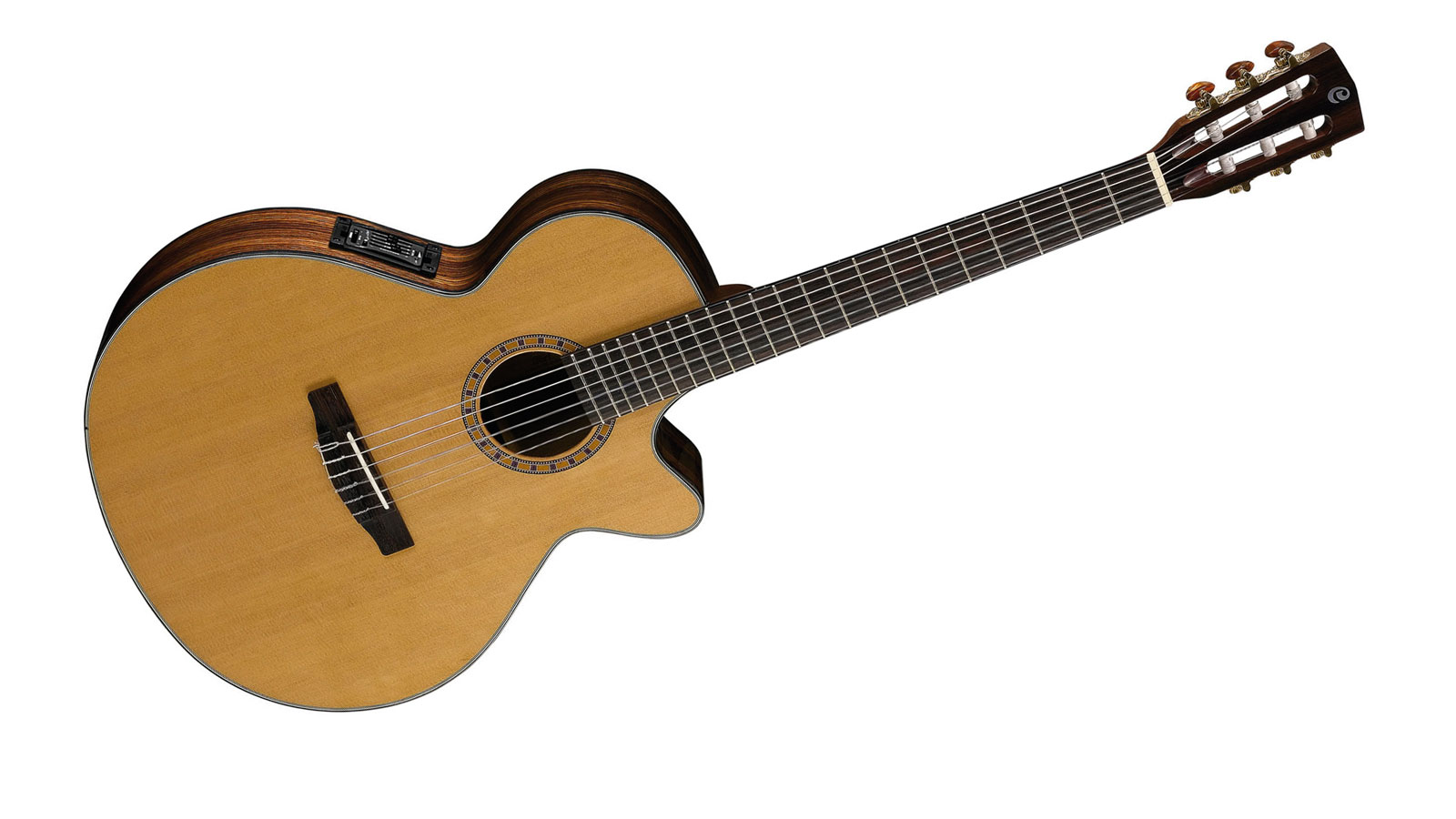MusicRadar Verdict
Affordable and stage-friendly, a good starter for nylon-string wannabes.
Pros
- +
Decent amplified onstage instrument. Excellent value for money.
Cons
- -
Not very loud unplugged. Lacks richness in the lower end. Onboard tuner was broken.
MusicRadar's got your back
Cort, like the majority of huge Asian brands, offers a diverse range of guitars. We last caught up with its collaboration with Manson guitars here in the UK, the Manson MBC-1 Matthew Bellamy Signature. This cutaway electro-nylon string couldn't be more different.
It has a few things in common, however, with that Bellamy signature in that it's very crisply made with an attractive price-point.
"It really has quite a percussive 'Spanish' tonality: crisp highs, a quick attack and not a huge sustain"
Combine a narrower nut width (44.9mm), some 6mm thinner than a concert classical, but with a wide classical-style string spacing at the tie-block bridge of 60mm, not to mention a lightly cambered fingerboard and reduced depth, and you have an intentionally stage-friendly, 'crossover' guitar.
It seems ideal for any player wanting to don nylons who doesn't want to go down the hardcore classical guitar route.
Construction-wise, it's classed by Cort as having an SFX outline, which falls into the grand-auditorium bracket and certainly isn't many millimetres away from Takamine's NEX outline, not least the upturned, round-nosed cutaway horn.
The body is wider than a conventional classical at 402mm and, as we say, the depth is reduced from a more classical dimension of approx 100mm, to 85mm.
Typical of the modern electro-nylons, we have an adjustable truss-rod although the three piece mahogany neck has a noticeable slight V to its profile in lower positions - much more steel-string-like. However, the crisp, tidy bracing at least includes proper classical-style fan bracing.
Want all the hottest music and gear news, reviews, deals, features and more, direct to your inbox? Sign up here.
Typical of the modern Chinese-made style, the fingerboard is bound with black plastic and, again quite typical at this price, the small frets, though very nicely installed, haven't been properly polished, giving a scratchy feel to any slight bend.
Powering comes from a simple Fishman setup: a Sonicore under-saddle married with a Presys preamp featuring volume, bass, mid and treble mini-rotary controls, plus a feedback-defeating phase switch and onboard tuner.
Sounds
Slackening off the strings and giving a good rub to the frets and fingerboard dramatically improves the feel of the guitar and takes all of 10 minutes.
Acoustically, well, it's far from the loudest nylon-string we've ever played, and lacks some richness in the lower end and lower mids. But as an amplified stage guitar - not to mention a perfectly good at-home practice instrument - it justifies its cost. It really has quite a percussive 'Spanish' tonality: crisp highs, a quick attack and not a huge sustain.
The D and A strings are a little underpowered, which might be the strings, or more likely a slight imbalance caused by the fitting of the under-saddle. Plus, the onboard tuner on our model doesn't work.
A little fingerboard TLC goes a long way, and the non-functioning tuner would immediately be sorted by any dealer. For a student, or a player wanting to experiment with the nylon 'crossover' genre without breaking the bank, certainly for onstage use and at-home practice, it's a very valid instrument.
Dave Burrluck is one of the world’s most experienced guitar journalists, who started writing back in the '80s for International Musician and Recording World, co-founded The Guitar Magazine and has been the Gear Reviews Editor of Guitarist magazine for the past two decades. Along the way, Dave has been the sole author of The PRS Guitar Book and The Player's Guide to Guitar Maintenance as well as contributing to numerous other books on the electric guitar. Dave is an active gigging and recording musician and still finds time to make, repair and mod guitars, not least for Guitarist’s The Mod Squad.

